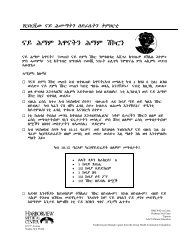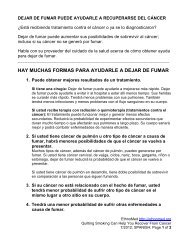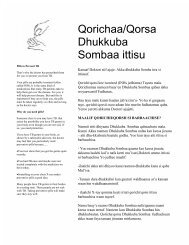Somali Knowledge Attitude Practices Study (KAPS) - EthnoMed
Somali Knowledge Attitude Practices Study (KAPS) - EthnoMed
Somali Knowledge Attitude Practices Study (KAPS) - EthnoMed
Create successful ePaper yourself
Turn your PDF publications into a flip-book with our unique Google optimized e-Paper software.
EBF means feeding children on breast milk and water and sugar for 3-6 months without giving<br />
solid foods. Among the agro-pastoralists, it was reported that a few mothers exclusively<br />
breastfeed for 1-4 months although animal milk and water are introduced at birth as well. This<br />
therefore implies that among the agro-pastoralists, EBF means giving infants breast milk, animal<br />
milk and water only without soft or solid foods. In urban areas a few mothers, (15-20% from<br />
Hiran), reportedly exclusively breastfeed for 4-6 months. This was attributed to the breastfeeding<br />
awareness during the World Breastfeeding Week celebrations which changed women’s attitude<br />
towards EBF.<br />
Frequency: In all livelihood zones, reports indicate that children breast feed on demand, so long<br />
as the mother is available and the child can access the breast. Maternal workload and situations<br />
where mothers have to be away from home for long hours in the farms or market were reported as<br />
the major obstacle to frequency of breastfeeding. In the riverine, and agro-pastoral communities it<br />
was reported that when mothers are often busy in the farms or in the market, children are<br />
breastfed less times compared to when the mother is at or near home.<br />
Continued Breastfeeding with Complementary food:<br />
Breastfeeding continues alongside complementary feeding until the time the child is completely<br />
removed from the breast when the mother gets pregnant or when the child is about 2 years old.<br />
Breast milk alone is believed to be inadequate for the child, hence, even before the soft or solid<br />
foods are introduced; cow/goat milk, water and porridge are fed to the children alongside<br />
breastfeeding.<br />
Total Duration of Breastfeeding:<br />
The study found that the total duration of breast feeding for children range from 1 year to 3 years<br />
among the pastoralists and agro-pastoralists. Among the riverine and urban communities,<br />
however, the duration of breastfeeding is shorter, about 1-2 years. In all livelihood zones, it was<br />
also noted that the proportion of children breastfeeding declines drastically after 12 months even<br />
though the children are still expected to be on the breast. Among the pastoral and agro-pastoral<br />
communities, more than 80% of mothers stop breastfeeding after 2 years, while a few mothers<br />
breastfeed for up to 3 years. In Gedo, breastfeeding continues up to 3 years, unless the mother is<br />
pregnant<br />
COMPLEMENTARY FEEDING<br />
Age of Introduction<br />
The study found that only a few mothers are aware that complementary food should be<br />
introduced to children after 6 months. Majority of mothers from all livelihood zones are not<br />
aware that complementary foods should be introduced when the child is six months old. Reports<br />
from all livelihood zones therefore show that soft and semi-solid foods are introduced from the 3 rd<br />
month while animal milk or powdered milk is introduced as early as one month or before. Breast<br />
milk alone is not considered adequate for the child to get satisfied.<br />
Choice and Types of Complementary Foods<br />
The types of food consumed by children vary by child’s age, socio-economic status and<br />
availability of the food items. Porridge, family food, (cereal-based ‘soor’ with sauce of<br />
tomato/onion; boiled maize/sorghum grains with oil & sugar) and tea are consumed daily by<br />
children from all livelihood zones. Fruits and vegetables are rare in the children’s diet as they<br />
were hardly mentioned by respondents from any of the livelihood zones during the data collection<br />
process. Rice, pasta, Canjero and meat were reported to be consumed once a week or<br />
23






